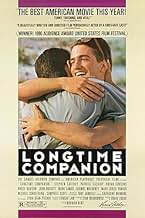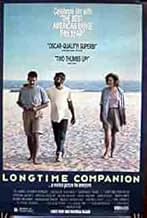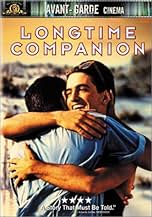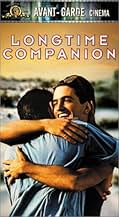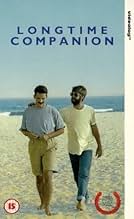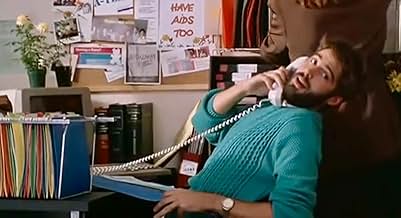ÉVALUATION IMDb
7,5/10
6,4 k
MA NOTE
Ajouter une intrigue dans votre langueThe emergence and devastation of the AIDS epidemic is chronicled in the lives of several gay men living during the 1980s.The emergence and devastation of the AIDS epidemic is chronicled in the lives of several gay men living during the 1980s.The emergence and devastation of the AIDS epidemic is chronicled in the lives of several gay men living during the 1980s.
- Nommé pour 1 oscar
- 6 victoires et 6 nominations au total
Avis en vedette
I was a physician in New York City from 1989 until 1992, and saw a tremendous number of people with AIDS. I feel that this movie, although it may appear to be dated, is an excellent portrayl of events that were all too common at that time. It gives a good sense of the confusion, misinformation, sense of being lost, and of not knowing what to do for those suffering and for their friends and companions. The actors did an excellent job in showing this. I believe that this movie is still important and merits being shown often.
i bought the DVD and watched it the other night. cried like a baby. i remember the fairly gay crowd i saw it with originally in the movie theater. two scenes are especially going to stay in my mind forever. the ICU scene and the bedroom scene with Bruce Davison telling someone that its okay and let go. i can believe why he was nominated for an Oscar, i am amazed that he didn't win. does anyone remember who did??
The film faithfully depicts an era of gay life that shocked some people and was applauded by others. its frankness was one of its best features. it was not a soap opera but a slice of real life, both joyous and tragic. as thousands still die every year, apparently a lot of people missed the point. it had no apologies and its many relationships: brother and sister, partner and partner, friend and friend are as vital today as then. gay in those days was based on sexual experimentation, it is unfortunate that the results were/are so deadly. i really suggest young people today find this film and pay attention. and if you haven't seen this, rent it/buy it/watch it. you won't soon forget it.
The film faithfully depicts an era of gay life that shocked some people and was applauded by others. its frankness was one of its best features. it was not a soap opera but a slice of real life, both joyous and tragic. as thousands still die every year, apparently a lot of people missed the point. it had no apologies and its many relationships: brother and sister, partner and partner, friend and friend are as vital today as then. gay in those days was based on sexual experimentation, it is unfortunate that the results were/are so deadly. i really suggest young people today find this film and pay attention. and if you haven't seen this, rent it/buy it/watch it. you won't soon forget it.
As the famous Blondie ballad The Tide Is High opens Longtime Companions the song got me thinking. The Tide was high for LGBT people in 1981 as we began winning more and more battles for civil rights ordinances in various municipalities across the country. Then life and the tide ebbed radically as a bisexual man brought a virus over from Africa that had been decimating population on that continent and it spread like a prairie fire amongst us. Longtime Companions focuses on the intertwining lives of several gay men and how the plague virus affected both the infected and those around them.
I lost so many people in the next 15 or so years I feel like an Ishmael at times, left alive to tell the tale. That's what Longtime Companions does, it tells the tale of the loss of so much from the most famous names of all like Rock Hudson to the most insignificant in the cosmic scheme of things. How much art, music, science, human freedom, name the field could have advanced if these people had lived their allotted normal lifespan. Those who survived and especially those who worked in the field have a responsibility to be Ishmaels.
Longtime Companions boasts a great ensemble cast that functions like a well tuned Rolex watch. Some of my favorites are Patrick Cassidy the soap opera hunk who loses his job and eventually his fight for life. Campbell Scott who throws himself into the fight after losing his Longtime Companion. Most of all lovers Bruce Davison and Mark Lamos and there will be no dry eyes as you see Davison guide Lamos from one world to the next.
Two things standout for me in the Eighties which decade this film covers about AIDS. The first was in 1983 and my first exposure to someone with the virus. In my working life with New York State Crime Victims Board and after I had come out at work, I got a call from a bedridden man in Tribeca whose home health attendant had just robbed him blind of everything and he called us because the cops at New York's 1st precinct refused to go to even take the report. As our office was downtown and my dear friend Ermano Stingo lived there as well, we both went to this man's flat, a rather dingy place overlooking the Hudson River that was pretty well emptied of most of what was there save this bedridden man with lesions going into his last stage of life. Sad to say both of us saw that sight a lot more over the next decade. I filled out my paper work for a claim, witnessed his signature and Ermano went to the 1st precinct to file the report on the victim's behalf. To this day I wish I could recall his name, but Ermano is also now in another world.
The second thing was the hearings for the New York City gay civil rights law. At the many forums the City Council gave us and our opposition to testify for the bill, I remember a lot of the homophobes walking in with surgical masks covering their faces as if that would prevent them from catching the disease from the opposition which they all assumed were sufferers or carriers. How ignorant they were and still are and worse how they did not want to be dissuaded from their firmly held beliefs. A frightening time for all.
To understand AIDS and its impact on LGBT people and society as well you have to see Longtime Companions. And this review is dedicated to both my claimant in the Tribeca flat and to the first person that I knew that died of AIDS, a bartender named Bobby Lynn who worked in a long since gone gay bar in Brooklyn Heights.
I lost so many people in the next 15 or so years I feel like an Ishmael at times, left alive to tell the tale. That's what Longtime Companions does, it tells the tale of the loss of so much from the most famous names of all like Rock Hudson to the most insignificant in the cosmic scheme of things. How much art, music, science, human freedom, name the field could have advanced if these people had lived their allotted normal lifespan. Those who survived and especially those who worked in the field have a responsibility to be Ishmaels.
Longtime Companions boasts a great ensemble cast that functions like a well tuned Rolex watch. Some of my favorites are Patrick Cassidy the soap opera hunk who loses his job and eventually his fight for life. Campbell Scott who throws himself into the fight after losing his Longtime Companion. Most of all lovers Bruce Davison and Mark Lamos and there will be no dry eyes as you see Davison guide Lamos from one world to the next.
Two things standout for me in the Eighties which decade this film covers about AIDS. The first was in 1983 and my first exposure to someone with the virus. In my working life with New York State Crime Victims Board and after I had come out at work, I got a call from a bedridden man in Tribeca whose home health attendant had just robbed him blind of everything and he called us because the cops at New York's 1st precinct refused to go to even take the report. As our office was downtown and my dear friend Ermano Stingo lived there as well, we both went to this man's flat, a rather dingy place overlooking the Hudson River that was pretty well emptied of most of what was there save this bedridden man with lesions going into his last stage of life. Sad to say both of us saw that sight a lot more over the next decade. I filled out my paper work for a claim, witnessed his signature and Ermano went to the 1st precinct to file the report on the victim's behalf. To this day I wish I could recall his name, but Ermano is also now in another world.
The second thing was the hearings for the New York City gay civil rights law. At the many forums the City Council gave us and our opposition to testify for the bill, I remember a lot of the homophobes walking in with surgical masks covering their faces as if that would prevent them from catching the disease from the opposition which they all assumed were sufferers or carriers. How ignorant they were and still are and worse how they did not want to be dissuaded from their firmly held beliefs. A frightening time for all.
To understand AIDS and its impact on LGBT people and society as well you have to see Longtime Companions. And this review is dedicated to both my claimant in the Tribeca flat and to the first person that I knew that died of AIDS, a bartender named Bobby Lynn who worked in a long since gone gay bar in Brooklyn Heights.
A landmark film, not only in that it is the first film to deal with the AIDS crisis, but also in its portrayal of gay men and their friends. Sitting on the cusp between earlier depictions of gays as murderous or suicidal and later caricatures of funny, sexless "best friends", the men shown here are very real and very honest in their decade long struggle with death and illness. I defy you to watch Bruce Davison's heartbreaking farewell speech and not be choked up on some level of emotion. And Mary Louise Parker add a special touche. This movie has arguably the greatest final scene in gay cinema.
The title is the newspaper obituary euphemism for a gay lover, and yet another discreet but frustrating reminder of how mainstream heterosexual society avoids confronting the AIDS epidemic. In an effort perhaps to offset public ignorance, Norman René's film of the same name almost resembles an AIDS awareness primer, dramatizing the deadly progress of the disease through the gay community since the summer of 1981, when 'safe sex' merely meant anything goes, but don't get caught. Like other American Playhouse productions the film is simple, unpretentious, and no less rewarding for being so straightforward. René and writer Craig Lucas have wisely resisted the temptation to make a 'Love Story'-style terminal illness melodrama, concentrating instead on the bittersweet pain and bravery of awkward hospital visitations and quiet deathbed encounters. Only the forced optimism of the final daydream rings false, unavoidably since the epidemic itself (still) has yet to be resolved by anything resembling a cure. The balance of the film is simply too honest to support such sentimental wish-fulfillment fantasies.
Le saviez-vous
- AnecdotesThe title refers to the only way that newspapers at the time would allow a gay man's lover to be listed in an obituary.
Meilleurs choix
Connectez-vous pour évaluer et surveiller les recommandations personnalisées
Détails
- Date de sortie
- Pays d’origine
- Langue
- Aussi connu sous le nom de
- Longtime Companion
- Lieux de tournage
- sociétés de production
- Consultez plus de crédits d'entreprise sur IMDbPro
Box-office
- Budget
- 3 000 000 $ US (estimation)
- Brut – États-Unis et Canada
- 4 609 953 $ US
- Fin de semaine d'ouverture – États-Unis et Canada
- 50 525 $ US
- 13 mai 1990
- Brut – à l'échelle mondiale
- 4 609 953 $ US
Contribuer à cette page
Suggérer une modification ou ajouter du contenu manquant



